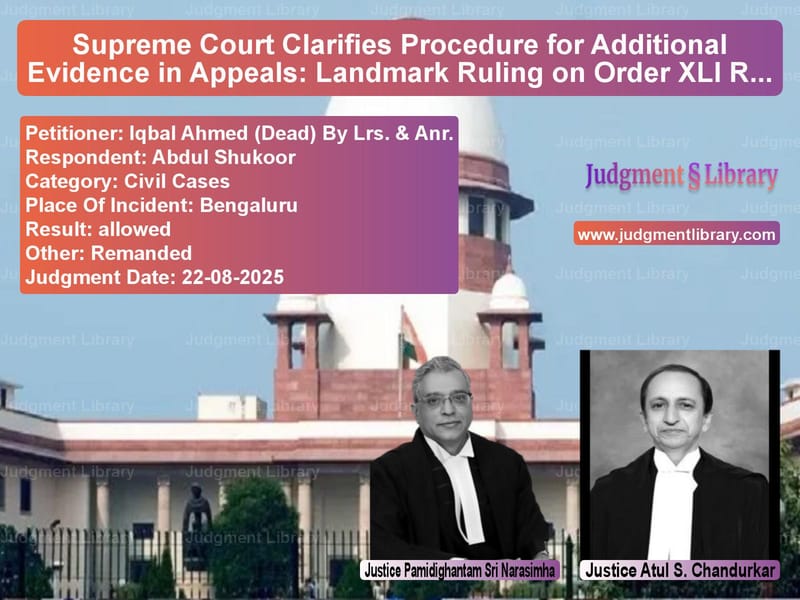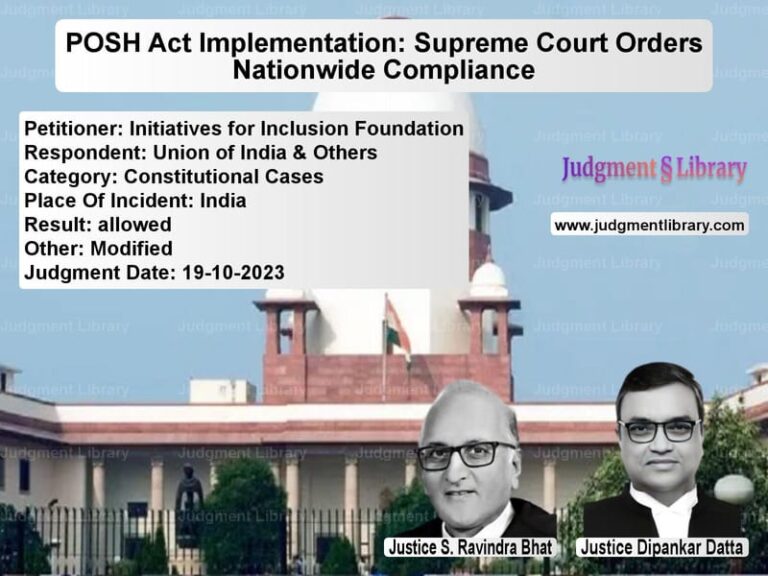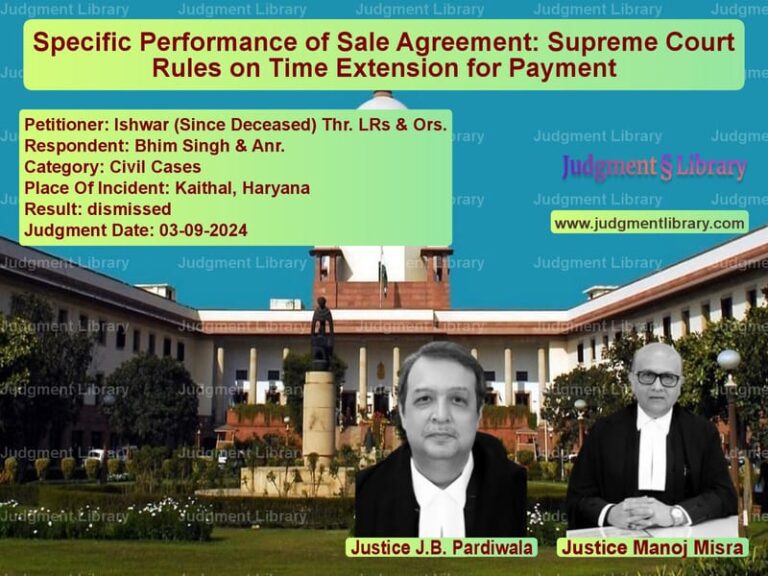Supreme Court Clarifies Procedure for Additional Evidence in Appeals: Landmark Ruling on Order XLI Rule 27
In a significant judgment that clarifies the procedural requirements for admitting additional evidence in appellate proceedings, the Supreme Court has delivered a landmark ruling emphasizing the crucial link between pleadings and evidence. The case, which involved a property dispute dating back to 1995, addresses the fundamental question of whether appellate courts must examine the pleadings of parties before permitting additional evidence under Order XLI Rule 27 of the Code of Civil Procedure. The Court’s decision establishes that evidence cannot be considered in isolation from the pleadings, and that appellate courts must ensure that any additional evidence sought to be introduced aligns with the case originally set up by the parties in their pleadings.
The Property Dispute That Spanned Decades
The legal battle began with an agreement to sell dated February 20, 1995, where the respondent Abdul Shukoor agreed to sell his house property in Bengaluru to Iqbal Ahmed for a consideration of ₹10,67,000. An advance payment of ₹2,50,000 was made on the date of the agreement, with a further payment of ₹2,50,000 made on March 30, 1995. The agreement was to be completed within one and a half years. The plaintiffs claimed they had sold other immovable properties to arrange funds for this purchase and needed the property for their bona fide use and occupation. When the defendant failed to execute the sale deed despite notices, the plaintiffs filed a suit for specific performance in 1996.
The Conflicting Decisions in Lower Courts
The Trial Court, after examining the evidence, decreed the suit in favor of the plaintiffs on February 19, 2000. The Trial Court held that the plaintiffs had proved the agreement to sell and their readiness and willingness to perform their part of the contract. However, the defendant challenged this decision before the High Court. During the appeal, the defendant filed an application under Order XLI Rule 27(1) of the Code of Civil Procedure seeking to produce additional documentary evidence. This evidence included certified copies of house tax demand registers, encumbrance certificates, sale deeds, and city survey endorsements. The High Court allowed this application and, after considering the additional evidence, reversed the Trial Court’s decree, holding that the agreement dated February 20, 1995, was not proved and that the plaintiffs’ case was not true.
The Supreme Court Hearing
Before the Supreme Court, Mr. Raghavendra Srivatsa, learned Senior Advocate for the appellants, made several compelling arguments. He submitted that “the plaintiffs had pleaded and proved their readiness and willingness to perform their part of the contract in accordance with the agreement dated 20.02.1995.” He argued that “the Trial Court after examining entire evidence on record, rightly held that the agreement dated 20.02.1995 had been duly proved and that the High Court erred in reversing this finding.” He further contended that “the defendant having admitted his signatures on the said agreement, it was not permissible for the High Court to have compared the signatures and thereafter take a different view from the one taken by the Trial Court.”
On the other side, Ms. Mahalakshmi Pavani, learned Senior Advocate for the respondent, defended the High Court’s decision. She argued that “the High Court was justified in reversing the finding that the agreement dated 20.02.1995 had been proved.” She maintained that “the High Court was justified in undertaking the exercise of comparing the signatures in exercise of the power conferred by Section 73 of the Indian Evidence Act, 1872.” Regarding the additional evidence, she submitted that “since it came to the knowledge of the defendant that the plaintiffs had not sold any immovable property as pleaded by them, the application seeking permission to lead additional evidence under provisions of Order XLI Rule 27 of the Code had been moved by the defendant.”
The Supreme Court’s Legal Analysis
The Supreme Court, comprising Justices Pamidighantam Sri Narasimha and Atul S. Chandurkar, conducted a thorough analysis of the procedural requirements under Order XLI Rule 27 of the Code of Civil Procedure. The Court emphasized the fundamental principle that evidence must be supported by pleadings. The judgment noted that in paragraph 9 of the plaint, the plaintiffs had specifically pleaded that they had disposed of their valuable immovable properties to purchase the suit property. In response, the defendant in paragraph 11 of the written statement had merely stated that he had no knowledge of such sales.
The Court made a crucial observation about the relationship between pleadings and evidence: “In our opinion, before undertaking the exercise of considering whether a party is entitled to lead additional evidence under Order XLI Rule 27(1) of the Code, it would be first necessary to examine the pleadings of such party to gather if the case sought to be set up is pleaded so as to support the additional evidence that is proposed to be brought on record.”
The Importance of Pleadings in Evidence Admission
The Supreme Court elaborated on the fundamental legal principle that evidence cannot travel beyond the pleadings. The judgment stated: “In absence of necessary pleadings in that regard, permitting a party to lead additional evidence would result in an unnecessary exercise and such evidence, if led, would be of no consequence as it may not be permissible to take such evidence into consideration.”
The Court relied on its earlier decisions in Bachhaj Nahar Vs. Nilima Mandal and Anr. and Union of India Vs. Ibrahim Uddin and Anr., which had established the principle that evidence without supporting pleadings is irrelevant and cannot be considered. The Court emphasized that “besides the requirements prescribed by Order XLI Rule 27(1) of the Code being fulfilled, it would also be necessary for the Appellate Court to consider the pleadings of the party seeking to lead such additional evidence.”
The Court’s Finding on Procedural Error
The Supreme Court found that the High Court had committed a fundamental procedural error by allowing the additional evidence without examining whether it was supported by the defendant’s pleadings. The Court noted: “It can be seen that the High Court has proceeded to consider the application under provisions of Order XLI Rule 27(1) of the Code without examining as to whether the additional evidence sought to be led was supported by the pleadings of the defendant in the written statement.”
The Court further observed that “in absence of such exercise being undertaken by the High Court in the present case, we are of the view that it committed an error in allowing the application moved by the defendant for leading additional evidence.”
Remand to High Court for Fresh Consideration
Given the procedural irregularity in the High Court’s approach, the Supreme Court set aside the impugned judgment and remanded the matter back to the High Court for fresh consideration. The Court held: “As we have found that the application for leading additional evidence has been considered by the Appellate Court without examining the aspect as to whether the additional evidence proposed to be led was in consonance with the pleadings of the defendant and whether such case had been set up by him coupled with the fact that the additional evidence taken on record has weighed with it while reversing the decree, the matter requires re-consideration by the High Court.”
Recognizing that the suit was filed in 1997, the Supreme Court requested the High Court to expedite the consideration of the appeal. The Court specifically clarified that it had not expressed any opinion on the merits of the matter, ensuring that the High Court would have complete freedom to reconsider the case afresh.
Broader Implications for Civil Procedure
This judgment has significant implications for civil litigation practice in India. It reinforces the fundamental principle that pleadings form the foundation of any case, and evidence must be tethered to the case set up in the pleadings. The decision serves as an important reminder to appellate courts that while they have discretion to admit additional evidence under Order XLI Rule 27, this discretion must be exercised judiciously and in accordance with established procedural principles.
The ruling emphasizes that the requirements of Order XLI Rule 27 are not merely technical formalities but substantive safeguards designed to ensure fairness and procedural integrity in the appellate process. By requiring appellate courts to examine pleadings before admitting additional evidence, the Supreme Court has strengthened the procedural framework that governs civil appeals and ensured that parties cannot spring surprises or set up new cases at the appellate stage that were not part of their original pleadings.
This judgment represents a significant contribution to the jurisprudence surrounding civil procedure in India and provides much-needed clarity on the proper approach to admitting additional evidence in appellate proceedings. It balances the need for procedural flexibility with the equally important requirement of maintaining the integrity of the judicial process and ensuring that cases are decided on the basis of properly pleaded facts rather than afterthoughts or belated revelations.
Petitioner Name: Iqbal Ahmed (Dead) By Lrs. & Anr..Respondent Name: Abdul Shukoor.Judgment By: Justice Pamidighantam Sri Narasimha, Justice Atul S. Chandurkar.Place Of Incident: Bengaluru.Judgment Date: 22-08-2025.Result: allowed.
Don’t miss out on the full details! Download the complete judgment in PDF format below and gain valuable insights instantly!
Download Judgment: iqbal-ahmed-(dead)-b-vs-abdul-shukoor-supreme-court-of-india-judgment-dated-22-08-2025.pdf
Directly Download Judgment: Directly download this Judgment
See all petitions in Specific Performance
See all petitions in Property Disputes
See all petitions in Contract Disputes
See all petitions in Judgment by P.S. Narasimha
See all petitions in Judgment by Atul S. Chandurkar
See all petitions in allowed
See all petitions in Remanded
See all petitions in supreme court of India judgments August 2025
See all petitions in 2025 judgments
See all posts in Civil Cases Category
See all allowed petitions in Civil Cases Category
See all Dismissed petitions in Civil Cases Category
See all partially allowed petitions in Civil Cases Category







